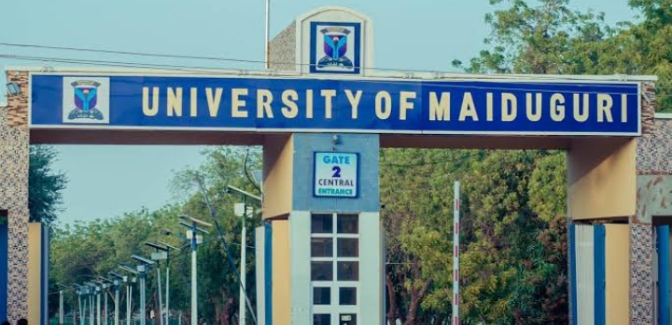1K
By Oscar Okhifo
The Academic Staff Union of Universities (ASUU), University of Maiduguri chapter has rejected the Federal Government’s decision to rename the university after the late President, Muhammadu Buhari, describing the move as ill-conceived and insensitive.
The union, therefore, called for an immediate reversal of the decision.
It further said that the institutional identity, historical significance, and lack of consultation are among the reasons for it’s stand against the name change.
The renaming, announced on Wednesday, July 17, by President Bola Tinubu during a special Federal Executive Council (FEC) meeting, was part of government’s efforts to immortalize the late Nigerian leader, who died on July 13 after a protracted illness.
According to the presidency, the decision was taken in recognition of Buhari’s “contributions to national development, especially in the education sector and the fight against terrorism in the North-East,” with Education Minister Dr. Tunji Alausa lauding the renaming as a “fitting tribute.”
However, the move has been met with criticism, particularly from stakeholders in the education sector and the northeast region, where the university is located.
In a strongly worded statement issued by ASUU University of Maiduguri chapter , the union expressed its disapproval, describing the renaming as a unilateral action that disregards the wishes of the university community and broader stakeholders.
“The University of Maiduguri is not just a name; it is a symbol of academic resilience and community identity in the face of national adversity,” the statement read. “Any attempt to erase that identity through politically motivated renaming is unacceptable and must be reversed.”
ASUU further faulted the federal Government for not consulting relevant university organs, alumni and traditional institutions.
The union warned that renaming such an iconic institution without due process sets a dangerous precedence and undermines the autonomy of Nigerian universities.
Echoing ASUU’s concern, students, alumni, and civic groups have launched online campaigns rejecting the new name, “Muhammadu Buhari University, Maiduguri”, arguing that the university’s legacy should not be politicized.
A petition launched by a coalition of UNIMAID alumni and concerned citizens has garnered over 1,600 signatures within days.
The petitioners contend that the university, which remained open throughout the height of Boko Haram insurgency, represents “the soul and strength of Borno and the entire North-East.”
Prominent public figures have also weighed in on the controversy.
Human rights activist, Omoyele Sowore condemned the renaming as “an insult to the history of the university,” while former senator Shehu Sani warned against the growing trend of renaming historic institutions after political figures.
“This is not how we immortalize leadership,” Sani said. “We must stop reducing universities to monuments of political patronage.”
Critics have proposed alternative ways to honour the late Buhari, including naming newer federal institutions such as the Nigerian Army University in Biu or the Federal University of Transportation in Daura after him, rather than renaming an already established and culturally significant institution.
Despite the backlash, the Federal Government has yet to issue any formal response or indication of a possible review.
Presidential Tinubu’s recent renaming of the University of Abuja after former Military Head of State, General Yakubu Gowon, passed without controversy. However, the attempt to rename the University of Maiduguri has triggered resistance which might become stronger in the days and weeks ahead .
This underscores the sensitivity around the identity of long-established institutions.
Recall a similar episode occurred in 2012 when President Goodluck Jonathan renamed the University of Lagos after the late MKO Abiola. That decision sparked widespread protests from students, alumni, and stakeholders, ultimately forcing the government to reverse the move and returned to status quo.
The union warned that unless the government rescinds the decision, it may be compelled to take further action in defence of institutional autonomy and historical integrity.



